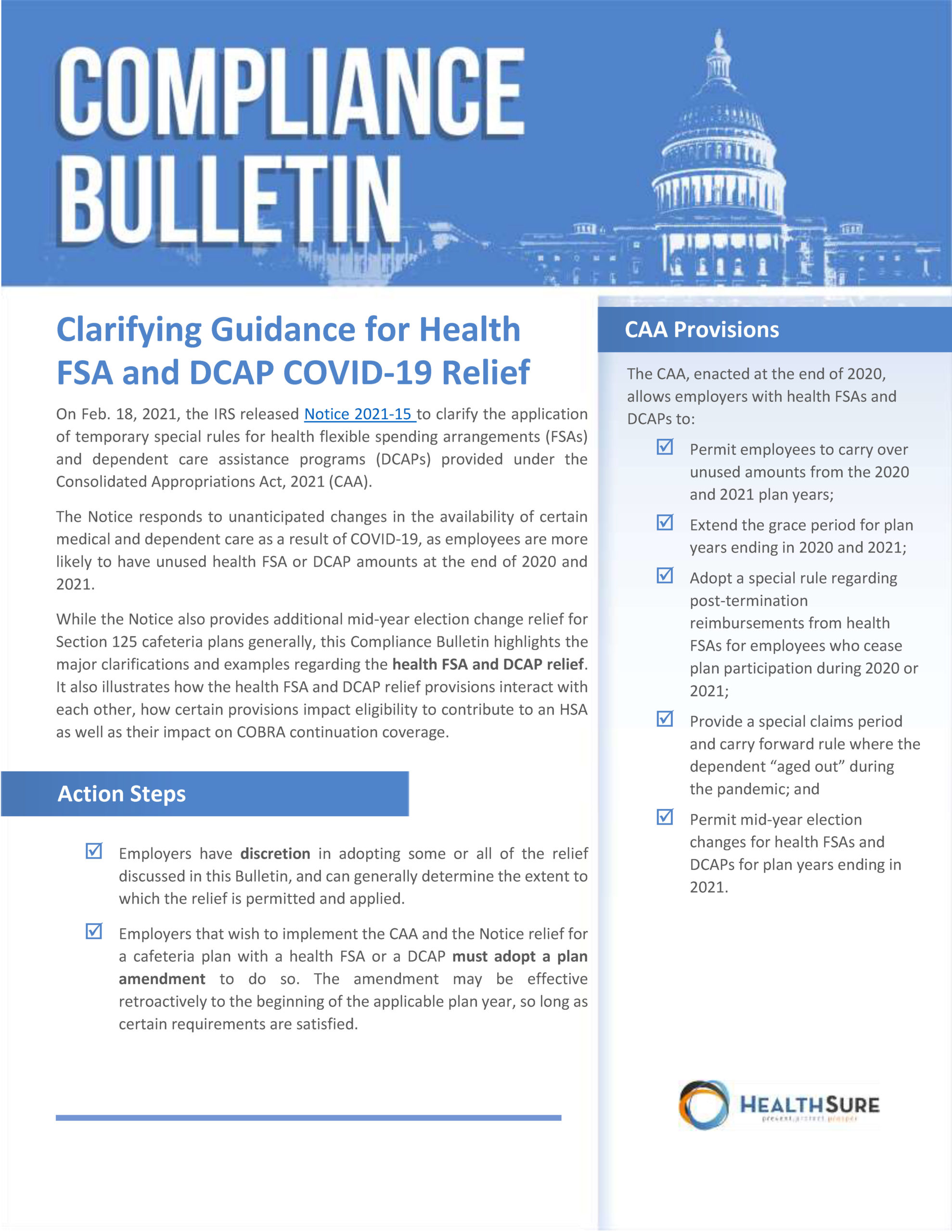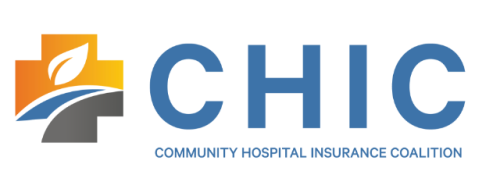Temporary COVID-19 Relief for Section 125 Plans
Wellness Incentive Proposed Regulations Withdrawn
Attraction and Retention Challenges Amid COVID-19
Clarifying Guidance for Health FSA and DCAP COVID-19 Relief
Temporary COVID-19 Relief for Section 125 Plans
On Feb. 18, 2021, the IRS released Notice 2021-15 to clarify special rules for Section 125 plans, health flexible spending arrangements (FSAs) and dependent care assistance programs (DCAPs).
Special Rules for Health FSAs and DCAPs
The Notice is intended to clarify the application of special rules for health FSAs and DCAPs under the Consolidated Appropriations Act, 2021 (CAA). The CAA provides flexibility for carryovers of unused amounts, extends the time period for incurring claims, allows post-termination reimbursements from health FSAs and provides special rules for dependents who “age out” of DCAP coverage during the COVID-19 public health emergency. The Notice provides details and examples regarding these rules.
Section 125 Mid-year Election Changes
The Notice’s relief for mid-year Section 125 plan elections for plan years ending in 2021 is similar to prior guidance for 2020. Section 125 plans may allow employees to make or revoke election changes in certain circumstances.
The Notice clarifies that employers can decide how long to allow mid-year election changes with no change in status during the plan year and can limit the number of election changes during the plan year that are not associated with a change in status.
Over-the-Counter Drugs
The Notice also provides relief with respect to plan amendments expanding reimbursable expenses for health FSAs and HRAs to include over-the-counter drugs and menstrual care products. Amendments to these plans must normally be made on a prospective basis, but these amendments may allow these reimbursements beginning on or after Jan. 1, 2020.
Wellness Incentive Proposed Regulations Withdrawn
On Feb. 12, 2021, the Equal Employment Opportunity Commission (EEOC) withdrew two proposed rules it previously issued in January 2021 on wellness programs under the Americans with Disabilities Act (ADA) and the Genetic Information Non-Discrimination Act (GINA).
Overview of the Proposed Rules
The proposed rules were issued in response to a federal court decision vacating part of prior EEOC rules describing the incentives an employer could offer as part of a wellness program in certain circumstances. The proposed rules would have generally allowed only de minimis incentives to be offered for wellness program participation. Exceptions allowing larger incentives would have applied to health-contingent wellness programs that are part of, or qualify as, group health plans under the ADA rules.
Withdrawal
These proposed rules were withdrawn because they were not published by Jan. 20, 2021, the time of President Joe Biden’s inauguration. Upon inauguration, the President issued a memorandum requiring all agencies to immediately withdraw any proposed rules that had not yet been published. As a result, the next steps for these proposed rules are currently under consideration.
Attraction and Retention Challenges Amid COVID-19
Attracting and retaining talent is often a top priority for HR departments. Given the effect the COVID-19 pandemic has had on the job market, one might imagine this task is easier than ever. Unfortunately, that’s far from the truth.
While there may be more candidates than usual, attracting quality talent and retaining top performers still remains a struggle, worsened by COVID-19 and its effects on the workplace.
This article shares some tips for attracting and retaining workers amid the COVID-19 pandemic.
Expand Hiring Pools
The COVID-19 pandemic has demonstrated how quickly teams can adapt, with some workplaces shifting entirely to telework. After months of remote-working success, many workplaces have said they will allow telework permanently even after the pandemic subsides. That’s because of the numerous advantages of remote work.
For one, these individuals won’t take up office space, saving room for others who need it. Additionally, this flexibility allows recruiters to expand hiring pools to anywhere with an internet connection. This can be a great benefit for employers that haven’t had luck finding quality talent near them.
Adapt the Workplace Layout
Amid the COVID-19 pandemic, many workers are concerned about their health and well-being while at work. By addressing these concerns, employers can bring peace of mind to employees and, in turn, attract workers who may have held reservations about their safety.
Employers can do this by adapting their workplaces to focus on worker health. This includes mandating social distancing, moving desks around, holding virtual meetings exclusively, allowing flex scheduling and offering telecommuting. At the end of the day, workplaces that demonstrate concern for employees will be the ones where individuals actually want to work. Conversely, if employees are forced to choose between their safety and their jobs, employers shouldn’t expect good retention.
Provide Meaningful Benefits
The pandemic has affected everyone in significant, yet unique, ways. While all employees may be struggling in some way, their situations aren’t the same. Employers can help lift up their workers by offering meaningful employee benefits.
Robust health care offerings may seem like an obvious one-size-fits-all solution, but sometimes voluntary benefits are actually what employees need. These include caregiving assistance, financial counseling, increased paid time off and other nontraditional perks. There are many low-cost options available and, better yet, employees can choose their benefits a la carte to meet their individual needs.
Clarifying Guidance for Health FSA and DCAP COVID-19 Relief
On Feb. 18, 2021, the IRS released Notice 2021-15 to clarify the application of temporary special rules for health flexible spending arrangements (FSAs) and dependent care assistance programs (DCAPs) provided under the Consolidated Appropriations Act, 2021 (CAA).
The Notice responds to unanticipated changes in the availability of certain medical and dependent care as a result of COVID-19, as employees are more likely to have unused health FSA or DCAP amounts at the end of 2020 and 2021.
While the Notice also provides additional mid-year election change relief for Section 125 cafeteria plans generally, this Compliance Bulletin highlights the major clarifications and examples regarding the health FSA and DCAP relief. It also illustrates how the health FSA and DCAP relief provisions interact with each other, how certain provisions impact eligibility to contribute to an HSA as well as their impact on COBRA continuation coverage.



